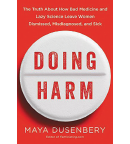BOOKMARK
Title: Doing Harm: The Truth About Bad Medicine and Lazy Science Leave Women Dismissed, Misdiagnosed, and Sick
Author: Maya Dusenbery
Publisher: HarperOne
Publication date: March 2018
Price: $27.99, hardcover, 400 pages

Over the past year or so, there have been several books by women focused on gender bias in medical treatment. Like many debates in today’s hyperheated sociopolitical atmosphere, the issue of gender-biased medical diagnosis and treatment raises temperatures, but in the end, it generally offers more questions than answers. A host of gender-biased medicine realities are documented in the well-researched book by Maya Dusenbery, Doing Harm: The Truth About Bad Medicine and Lazy Science Leave Women Dismissed, Misdiagnosed, and Sick. The author is an editor of the website Feministing.
Anecdotes Galore
The book is divided into three sections and seven chapters, separated by subheads into easy-to-digest parcels. The author leads off with an informative introduction that traces the rise of the American medical profession, a white male patriarchy, and its inherent gender bias, which still lingers today. There’s a blizzard of scathing anecdotes, none of which are referenced. She assures the reader that what she writes is valid, thus: “There is research to back up these anecdotes, though not as much as you might imagine, only because, I came to learn, there’s little research on diagnostic errors in general, which are described by experts as an enormous blind spot within the profession.” Readers of science-based books generally prefer referenced data to blanket assurances, and careful readers may wonder why her editor did not clarify that clunky sentence.
Personal Stories Ring True
To her credit, Ms. Dusenbery begins each chapter with a personal case history of women she interviewed for the book. Many of the stories are compelling, and readers will empathize with patients who have been harmed, emotionally and physically, by true examples of gender bias. The author never paints male doctors as sexist villains; instead she unearths bias issues endemic to the system itself.
That said, she too often strays into territory better suited for an opinion blog than a serious science book. For instance, in a section called “Doctors Think That Men Have Heart Attacks and Women Have Stress,” she cites a Yale School of Public Health study of younger female patients who have had heart attacks and who overwhelmingly (93%) noted that their first symptom was chest pain. She writes, “And yet, these women told stories of unresponsive health-care providers. One woman, for example, called her doctor to report acute chest pain and was told to schedule a regular appointment, for 5 days later.”
Focus on Ovarian Cancer
Readers of The ASCO Post may be interested in Ms. Dusenbery’s take on gender bias in cancer. However, she seems less sure of herself in this arena and tiptoes about in a blizzard of generalizations, saving her most potent remarks on cancer for the book’s conclusion. Using ovarian cancer to frame her discussion, the author traces the frustrating history of treating a disease with highly discreet symptoms. She makes many valid points about how the medical establishment dropped the ball in addressing health issues surrounding ovarian cancer. The best section is devoted to Dr. Barbara Goff, a gynecologic oncologist whose research developed a useful ovarian cancer symptom index.
Doing Harm deals with an identifiable disparity in health care: gender bias.—
Tweet this quote
Dr. Goff bolsters the books underlying theme of gender bias by saying, “I’ll tell you, there are still some who say we shouldn’t be teaching women about symptoms of a potentially fatal disease because all it does is cause women to worry…and if you tell them the symptoms, they have them by the next day.”
Doing Harm deals with an identifiable disparity in health care: gender bias. Keeping in mind much of the material is anecdotal, the author makes strong points about our health-care system, which many women may find empowering. However, solutions are modest and given a mere 2 pages at the end of a 400-page book. She writes, “Many of the people I interviewed also encouraged women to become well-informed, educated health-care consumers. They should do their own research on their conditions.” That is sound advice that stretches far beyond gender, race, or any other identity issue. Although Ms. Dusenbery’s writing is adequate, her overall message about gender bias in our health-care system is worth the time for readers of The ASCO Post. ■

